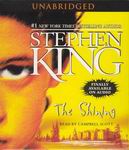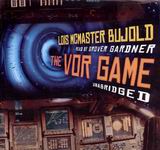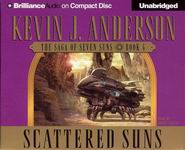
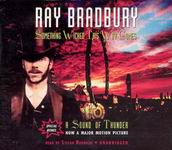 Something Wicked This Way Comes (with A Sound of Thunder)
Something Wicked This Way Comes (with A Sound of Thunder)
By Ray Bradbury; Read by Stefan Rudnicki
8 CD’s – 9.5 hours [UNABRIDGED]
Publisher: Blackstone Audio
ISBN: 0786175354
Date Published: 2005
Themes: / Fantasy / Halloween / Carnival / Magic / Supernatural / Aging /
Sometime each October, a line is crossed; the line between falling leaves and fallen leaves, between shirtsleeves and a jacket, between the relief that summer has ended and the slight dread of the upcoming winter. Most of us don’t really notice the moment of crossing; we look up sometime afterwards and wonder where all the pumpkins came from. Some people, though, are exquisitely aware of this moment; they live in it, they draw it out and savor it, and a special few of them create art about it that allows the rest us to actually experience it. Dave McKean captures it with his eerie photo collages, M. Ward puts his old-young-man voice to good use singing about it, particularly in a track called “One Life Away,” and Terry Gilliam almost-but-not-quite captured it on film in the recent The Brothers Grimm. Ray Bradbury did some of his best work while inhabiting it. In The Illustrated Man and The October Country, he told stories about people’s lives intersecting that weird border. In The Halloween Tree, he abandoned story for the most part, and spent his time describing the sensory experience of the moment of crossing. In Something Wicked This Way Comes, recently released as an audiobook by Blackstone Audio, he skillfully combined plot and description to examine this and life’s other unnoticed, but profound, sea changes.
Will Halloway and Jim Nightshade are the young protagonists of the story, best friends born just two minutes apart, but each on a different side of the line. Each of the boys personifies their respective border country; Will is blue-eyed and blonde, responsible, mannered, charming, the type of kid who looks like he was born wearing a scout uniform. Jim is darker, his eyes and his hair, but also his mood and personality. While it would be easy (and tempting) to say that Will is “better” than Jim, Bradbury shows his wisdom by describing the value of both of the boys’ attributes, how one, without the other, is vulnerable and incomplete, and how the different elements each boy bring to the friendship ultimately strengthen it.
The story follows Will and Jim as they cross a number of boundaries; the October line, the line between boyhood and adolescence, and the line between innocence and experience. The arrival of a strange carnival to the boys’ idyllic town complicates these passages. “Cougar and Dark’s Pandemonium Shadow Show” is indeed something wicked, and the danger it presents to the boys and their town makes for an engaging, suspenseful tale.
Audiobook veteran Stephen Rudnicki reads Something Wicked, and gives a largely enjoyable performance, with only a few rough spots. Listeners familiar with Rudnicki will understand that dialogue between two pubescent boys isn’t exactly the perfect material for his sonorous voice. Everything is forgiven, however, when Mr. Dark makes his entrance. Rudnicki’s reading of the tattooed ringmaster’s introductory sentence literally gave me chills. Mr. Cougar, the Dust Witch, and the rest of the Shadow Show freaks are also done justice by Rudnicki’s interpretations.
Blackstone Audio seems to have heard my pleas for more DVD-type extra features on audio books, and have included an extra disc with a Bradbury short story, “A Sound of Thunder,” also read by Rudnicki. The story, a powerful exploration of the dangers of time travel, was recently made into a motion picture starring Edward Burns (and almost universally panned).
An interesting element of this audio book is that, whether by accident or design, the discs almost invariably ended at a point of terrific suspense. Rather than simply turning a page to assuage my anxiety about the fate of the characters, I was scrambling to eject discs, open cases, balance discs on my various fingers and insert new discs. Call me a masochist, but I thought it actually made the experience more enjoyable. Even listeners who don’t share my Hitchockian penchant for prolonging a story’s tension will have a hard time finding a better group of guides than Bradbury, Rudnicki, Jim, Will, and Mr. Dark for this year’s passage over that peculiar line.
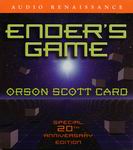
 Ender’s Game: Special 20th Anniversary Edition
Ender’s Game: Special 20th Anniversary Edition